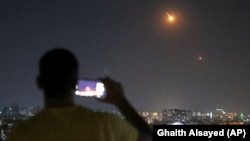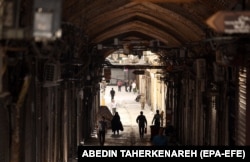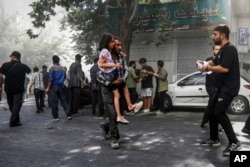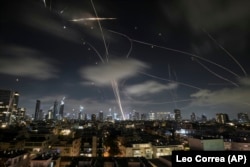Despite the ongoing conflict with Israel, shelves in many supermarkets in Tehran remain heavy with supplies.
“There is no one to buy anything,” Mahsa, a resident of a western suburb of the Iranian capital, explains to RFE/RL. She estimates that 60-70 percent of the residents of her usually bustling neighborhood have fled amid Israeli strikes on Iran. Her local supermarket, which is usually open until midnight, now closes at around 9 p.m., apparently due to a lack of customers.
On avenues where she frequently has to drive around the block repeatedly to find a parking spot, Mahsa says today “in my street there are just two or three cars; it’s a little scary and it’s very sad.”
Those locals that remain are largely staying in their homes, and most businesses are shuttered. Out on the street “the whole air that you breathe is sad,” Mahsa says.
Many residents of Tehran have headed north, toward the Caspian Sea coastline, a traditional vacation spot for people from the Iranian capital. Mahsa, who asked RFE/RL not to use her surname for security reasons, has opted to stay and wait for whatever is coming.
When Israeli strikes began on June 13 she says “I was so shocked. I could just pack a bag with my very sentimental and essential things.”
But she says, despite friends and relatives calling for her to join them outside the capital, "I was like, 'Oh my God, I don’t want to leave my home.'" In her area of Tehran, known as a vibrant youth hangout, she believes there are no military targets.
“I’m so sure in my heart that [the Israelis] are not going to just destroy living homes without any purpose,” she says.
More than 500 people in Iran are reported to have been killed by Israeli strikes since June 13. Pictures captured by photojournalists in Tehran show severely wounded people, including children, following strikes on the Iranian capital.
"Israel and America are our enemies," Mahsa says. "But it’s like I trust them more than my own government. This is a very bad situation."
The Tehran native says that, among her circle of middle-class Iranians, most hope for the conflict to result in the collapse of the Iranian regime, largely due to the extreme economic situation.
Since the COVID-19 pandemic, she says, costs have soared to the point that, “you don’t have anything, you can’t plan for anything, even a very tiny one day trip.”
According to Mahsa, even humble culinary treats are increasingly out of reach for ordinary Tehran residents.
“For example, if you always had something like olives in your kitchen, now you can’t [afford to] have that in your kitchen," she says. "Then you can have them once a month, then you can have them just once a year, then you have to just delete them from your life.”
“These days people here in Iran, most of them, I mean the ordinary ones, the mid-level ones like me they just have money for eating and transport from here to there in the city,” she adds. “When you stay in this situation for two, three years, then you are hopeless, you are just [thinking] what am I doing? We all know that everything can be so hard after this [conflict] but we have this hope, even a very teeny tiny drop of hope that something can change.”
In Israel, journalist Nicole Jansezian pauses while speaking with RFE/RL as she receives an alert that Iranian missiles are incoming. After confirming the warning doesn’t affect the area near her family apartment in Jerusalem, she continues talking.
Jansezian compares life in Israel today to COVID lockdowns. “Schools have been shut down as well as workplaces and places of entertainment like restaurants, gyms, etc.,” she says.
Jansezian documents daily life under Iranian missiles and told RFE/RL that she believes there is widespread support, at least among Jewish Israelis, for the strikes on Iran, which the country’s military has called Operation Rising Lion.
However, she says public support may waver if civilian deaths in Israel continue to mount. Twenty four people in Israel have been killed since Iran began launching its own missile and drone barrages.
“Running to shelters in the middle of the day, in the middle of the night, and not having any routine,” Jansezian says, “those are the things that I'm not sure how much patience Israelis have for.”
As the conflict with Iran continues to dominate headlines, she says the Israeli hostages kidnapped by Hamas amid the October 7, 2023 attacks, have dropped out of the headlines, “which is really frustrating for their families.”
Although she emphasizes that no one has had time to gauge public opinion adequately, Jansezian says she thinks most Israelis hope their country’s attack on Iran will bring an end to the Islamic regime in Tehran.
Israelis “really feel like the Iranian people are for us, and we are for them," the journalist says, pointing to Israeli rallies in support of the 2022 Woman, Life, Freedom protest movement.
“I think Israelis think and believe, and maybe the Iranian people as well, that they have a mutual enemy, that both the enemy of Israel and the enemy of the Iranian people is the Iranian regime," she adds. "And so they're really looking for an end to that."












